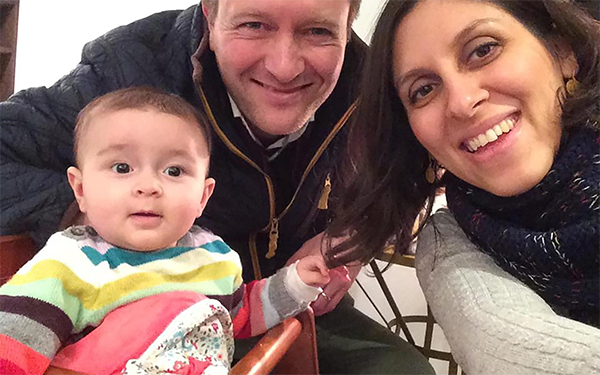
Nazanin Zaghari-Ratcliffe (R) posing for a photograph with her husband Richard and daughter Gabriella (L). CREDIT: AFP
2019-01-03- The Telegraph – Nazanin Zaghari-Ratcliffe, the British-Iranian charity worker in prison in Tehran on espionage charges, is to go on a hunger strike in protest at the “inhuman” denial of medical care.
Mrs Zaghari-Ratcliffe, writing from Evin prison, said she intends to go on a three-day hunger strike later this month alongside prominent human rights activist Narges Mohammadi to demand access to a doctor.
In a letter published by Tehran-based charity Defenders of Human Rights Centre, Mrs Zaghari-Ratcliffe said both women were banned from receiving medical treatment despite “frequent requests”.
“In protest to this illegal, inhuman and unlawful behaviour, and to express our concerns for our health and survival at this denial of specialist treatment, despite taking daily medicines, we will go on hunger strike from 14.01.2019 to 16.01.2019,” the letter said.
“We announce that in the event of the authority’s failure to address these concerns and them further endangering our health, we will take further action.”
Richard Ratcliffe, Mrs Ratcliffe’s husband, has said she has been left feeling depressed and anxious.
“Nazanin is currently having medical treatment blocked for lumps in her breasts, for neurological care over her neck pains and numbness in her arms and legs, and seeing an outside psychiatrist has been banned,” he told the Telegraph.
“These are all being personally blocked by the head of Evin clinic, Mr Khani, despite having been approved by the prison doctor.”
He said he spoke to her on Christmas Day and noted she sounded “flat”.
“I think for Nazanin turning 40 (on Boxing Day) and realising she might be kept until she can never have another child has been a real tipping point,” said Mr Ratcliffe, 43, from Hampstead, north London.
“The denial of seeing a specialist to get the lumps checked in her breasts was a last straw. She has decided that enough is enough. Talking and lobbying in other ways hasn’t worked.”
Mrs Zaghari-Ratcliffe, who was working for Thomson Reuters Foundation, was arrested in April 2016 at the international airport in Tehran, when she was leaving the country after a visit with her family.
She was charged with ambiguous accusations of spying and plotting against the Islamic Republic and sentenced to five years in prison.
She is eligible for parole, having served half of her sentence, however, this has so far been refused by Iranian authorities.
Mrs Zaghari-Ratcliffe’s lawyer had previously confirmed that he had filed a request for medical care, but said all her requests have gone unanswered.
Ms Mohammadi, who is a vice president of the Defender of Human Rights Centre, is serving a 16-year sentence for her human rights work.
The 46-year-old was transferred from her cell in Evin prison in Tehran to Imam Khomeini Hospital last summer due to the intensification of her illness and muscular spasms.
She had been suffering from severe pains for weeks before the date of her transfer, however her applications for transfer to hospital for treatment were previously refused.
“In general, Iranian authorities do not treat political prisoners and prisoners of conscience well. They do this to put pressure on them to force them to stop their activities,” Shirin Ebadi, an Iranian lawyer and founder of Defenders of Human Rights Centre, told the Telegraph.
“If this issue attracts the attention of the public then the government may at least respect its own laws and allow the two women to receive treatment.”
